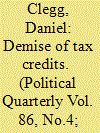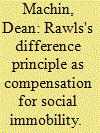| Srl | Item |
| 1 |
ID:
114314


|
|
|
|
|
| Publication |
2012.
|
| Summary/Abstract |
Residential energy-efficient and renewable energy (EERE) products play an important role in energy conservation and carbon emissions reduction. Various financial incentive programs have been developed to promote the adoption of these products. However, their effectiveness in attracting consumers is not very well understood. In this study, we investigated impacts of financial incentives on homeowner's decision making towards six EERE products. Two forms of incentives, tax credits and interest-free loans, were examined through a household mailing survey in Florida, the United States. Results showed that, although half of the respondents were interested in EERE products, the high investment cost was a major concern that hindered their purchase activities. Homeowners were attracted to financial incentives and valued tax credits much higher than interest-free loans. The current federal home energy tax credit levels were found to attract only 2-12 percent of homeowners to buy EERE products. The willingness of participation was especially low for the costly products (such as solar panels). The participation rate was also very low for lower income (i.e., annual household income below $50,000) families living in older residences. This study contributes to the understanding of economic and social aspects of consumer decision making on energy efficiency and alternative energy.
|
|
|
|
|
|
|
|
|
|
|
|
|
|
|
|
| 2 |
ID:
141756


|
|
|
|
|
| Summary/Abstract |
Introduced in the late 1990s, tax credits grew under successive Labour governments to become a cornerstone of UK social policy. Distinguished from traditional welfare policies by their target group and their mode of administration, and with goals that appeared capable of commanding support across the ideological spectrum, tax credits until recently seemed to hold the key to tackling poverty in a politically popular manner. But since 2010 the tax credit system has been systematically dismantled, initially qualitatively and latterly also quantitatively. This paper discusses the multiple factors that help to explain the rapid fall from grace in the UK of this liberal approach to supporting the incomes of poor working households.
|
|
|
|
|
|
|
|
|
|
|
|
|
|
|
|
| 3 |
ID:
097265


|
|
|
|
|
| Publication |
2010.
|
| Summary/Abstract |
In the 110th Congress (2007-2008) legislation related to climate change was introduced at a faster pace than in any previous Congress, yet it did not result in a corresponding increase in enacted climate-related laws. A pertinent example of the political infeasibility of climate policy change in the 110th Congress is the case of tax credit extensions for production of renewable energy. While this issue in itself was uncontroversial, the extensions were only adopted in the 11th hour, after innumerable failed attempts. With an analytical point of departure in Krehbiel's theory of pivotal politics, this paper seeks to identify pivotal legislators in the case of the tax credit extensions and discusses how changes in the composition of pivotal legislators in the 111th Congress (2009-2010) may impact the prospects of moving climate legislation more generally. The analysis indicates that a majority of the legislative pivots in the case of tax credit extensions were Republican senators representing coal-producing states. In the case of climate change, however, the regional dimension is likely to be more significant for Democratic voting behaviour. Thus, the opportunity space for climate legislation in the 111th Congress remains narrow even with a reinforced Democratic majority in Congress.
|
|
|
|
|
|
|
|
|
|
|
|
|
|
|
|
| 4 |
ID:
127007


|
|
|
|
|
| Publication |
2013.
|
| Summary/Abstract |
Outside academia, John Rawls's theory of justice-justice as fairness-has had little impact. This article is part of a broader project to rectify this. I offer a distinctive, second-best, argument for Rawls's difference principle. The difference principle requires that inequalities in income and wealth are justified only if they benefit society's least-advantaged citizens. My paper argues that, slightly-modified, the difference principle is an excellent principle of redress in light of the UK's continued failure to give all citizens fair career chances. I show how we might realize the difference principle at the level of policy through tax rate reductions or negative tax rates. I conclude that if you don't want to accept the second-best argument for the difference principle you must get serious about giving all citizens fair career chances. As I suggest, this task is extremely difficult.
|
|
|
|
|
|
|
|
|
|
|
|
|
|
|
|